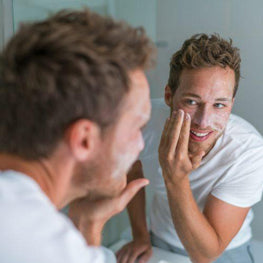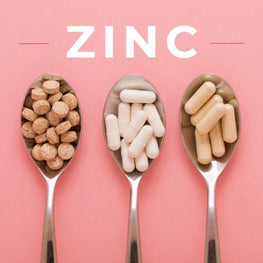Introduction
Are you sick and tired of your skin breaking out? Do you feel like you’ve tried every lotion and over-the-counter acne treatment there is under the sun with no success? And just when you think your skin is clearing up, another seems to sprout elsewhere!
We typically associate acne with the years of adolescence however, unfortunately it can continue to appear throughout our adult years too. In fact, up to half of all men and women experience acne well into their 30’s. The impact of acne is also far more reaching than simply blemishes on the skin. Alarmingly, chronic acne sufferers are more likely to experience anxiety, depression, suicidal thoughts, poorer employment outcomes and lower self-esteem than non-acne sufferers.
What Causes Acne?
Acne vulgaris is an inflammatory disease of the skin which affects those areas which contain sebaceous glands including the nose, forehead, cheeks, chin, back and trunk. It is a multifaceted condition which needs to be treated more than just topically. It actually reveals that something more is going on inside and needs to be addressed.
There are many varied causes and triggers of acne. They include:
-
High insulin levels
High insulin levels, associated with insulin resistance, are implicated in the development of acne. A high glycaemic load diet which involves high intakes of refined carbohydrates (a typical Western diet) leads to a persistent elevation of serum insulin. This then causes an imbalance in androgen levels (male hormones) which triggers an increase in epithelial cell proliferation and an increase in sebum production under the skin. Both are risk factors for acne. Insulin resistance may occur during various clinical conditions such as physiological conditions (e.g. puberty, pregnancy, old age, physical inactivity), as a side effect of certain medications (e.g. corticosteroids, some oral contraceptives, diuretics), or as a symptom of certain diseases (e.g. type 2 diabetes, cardiovascular disease, essential hypertension, PCOS, non-alcoholic fatty liver disease, certain cancers, sleep apnoea syndrome).
-
Other dietary factors
Several reports suggest that dairy consumption may also be a cause for acne outbreaks. Even though milk has a low glycaemic index, it could aggravate the acne by increasing the levels of insulin-like growth factor-1 (IGF-1) which increases keratinocyte proliferation and apoptosis. Milk also contain hormones including estrogen, progesterone, androgen precursors and 5α-reductase steroids which tend to be pore-clogging leading to breakouts.4
Chocolate is another food which can cause acne flare ups as it too can cause hyperinsulinemia. Other studies have concluded that amino acids found in chocolate (e.g. arginine, leucine, phenylalanine) can elevate insulin levels. Chocolate also contains caffeine, theobromine, serotonin, phenylethylamine, triglycerides, and cannabinoid-like fatty acids that induce insulin resistance.
-
Hormonal imbalance
Hormones can also play a major role in the development of acne. For a lot of people, issues with acne start in their adolescence as their body goes through major hormonal changes. Women also often experience acne the week before their period and for others, during pregnancy. Acne is formed when excess androgens (male hormones) stimulate increased oil production and skin cell turnover in pores. These skin cells then get stuck in the pores, mixing with the oil to form a hard plug. When blocked pores become infected and inflamed, this turns into acne. Excess androgens can be caused by:
- Poor blood sugar balance- this causes an increase in insulin, which stimulates androgen production from the ovaries in women.
- Stress - stimulates androgen production from our adrenal glands
- Polycystic ovarian syndrome (PCOS)
- Genetic susceptibility
- Nutrient deficiencies - these can impact your body’s ability to detoxify used hormones and your ability to make hormones that compete with androgens, thus reducing their effect
- Poor liver function- this can affect metabolism of hormones and lead to poor clearance of toxins
-
Gut issues - if your gut isn’t functioning properly, hormones can become recirculated instead of excreted. Poor gut health can also affect nutrient absorption. Hormones can play a major role in the development of acne

-
Low Zinc Levels
Studies have shown that acne patients of both genders have been found to have serum zinc levels on average 28.3% lower than control subjects. Hair levels were 24.3% lower and nail levels were 26.7% lower than controls. Serum zinc levels have also been associated with the severity and type of acne lesions. Zinc is important as it reduces androgen production, speeds up skin healing, balances sebum production, reduces inflammation and reduces keratin production to unclog pores. In fact, studies have shown that topical medications containing zinc are equal to or superior to commonly used medications used alone in reducing the severity of acne.
-
Genetics
Studies have shown that hereditary factors are important in determining susceptibility to acne.
A large twin study based on 458 pairs of monozygotic and 1099 pairs of dizygotic twins, all females with a mean age of 46 years was performed to investigate the relative contribution of genetic and environmental factors on the susceptibility to acne. The results demonstrated that 14% of the twins reported a history of acne. Genetic modelling showed that 81% of the variance of the disease was attributable to additive genetic effects. The remaining 19% was attributed to unique (i.e. unshared) environmental factors. Another study that measured 20 pairs of identical and non-identical same-sex twins. The identical twins had virtually identical rates of sebum excretion but they had a significantly different degree of acne severity. The non-identical twins had significantly different sebum excretion rates as well as different degrees of acne severity. These findings suggest that although sebum secretion is under genetical control, the development of clinical lesions is modified by environmental factors. Or in other words, genes load the gun, environmental factors pull the trigger.
-
Certain medications
Certain medications may also lead to or exacerbate acne. Corticosteroids used topically or in high oral doses can cause steroid induced acne, and the use of anabolic steroids can cause what is known as “bodybuilder’s acne.” Halogen acne is caused by iodides, bromides and fluorides that induce an acneiform eruption similar to that observed with steroids, for example, iodine from kelp. Some progestin-only birth control pills can cause your androgen levels to fluctuate which can lead to an increase in hormonal acne. Other medications that can cause acneiform eruptions include lithium, isoniazid, phenytoin, phenobarbitone, immunosuppressants and certain anticancer agents and radiotherapy.
-
Environmental Pollutants
Air pollutants can trigger acne by increasing oxidative stress which can alter normal functions of lipids and proteins in the skin. One Chinese study conducted during 8 weeks on 64 acne patients, showed a relationship between exposure to environmental pollutants and increased sebum levels and a higher number of acne lesions. Acne has also been frequently observed in industry workers after long-term exposure to certain organic compounds such as coal tar or crude oil. A chronic type of acneiform eruption known as chloracne is caused by exposure to certain halogenated aromatic hydrocarbons and is considered to be one of the most indicative markers of systemic poisoning by these compounds. Dioxin is the most potent environmental chloracnegen. Other exposures mainly result from contaminated industrial wastes and contaminated food products. Severity is directly correlated to dosage of exposure, potency and individual susceptibility. Finally, tobacco and cannabis consumption have also been considered pollutants which may play a role in acne as well as certain pesticides which can induce hormonal abnormalities and result in the accumulation of androgens. Air pollutants can trigger acne by increasing oxidative stress which can alter normal functions of lipids and proteins in the skin
-
Occupational factors
The use of aggressive skin routines and inappropriate cosmetics may cause acne flare-ups. These products modify the skin barrier and the microbial balance on the skin especially in the sebaceous area, activating the innate immunity response and triggering inflammation. When choosing your face products, be wary of comedogenic ingredients, essential oils or too greasy or oily foundations, powder make-up, aggressive skin cleansers and soaps. Some hair products have also been reported to cause comedones and cysts on the forehead and temple. Friction and sweating, for example from headbands, back packs, bicycle helmets or tight collars can initiate or aggravate acne lesions as can frequently touching your face and squeezing and picking comedones.
-
Stress and other modern lifestyle factors
Stress has been shown to impact on inflammatory skin diseases such as acne. Cells that produce sebum have receptors for a stress-related hormone called or corticotrophin-releasing hormone, or CRH. CRH can bind to the receptors in the skin’s sebaceous glands which can increase the skin’s oil production, activate pathways affecting immune function and ultimately drive up inflammation. People who are stressed also tend to sleep poorly, consume less healthy foods and break away from their usual skin-care routines- all of which could further promote acne breakouts.
Research has also found that short wavelength visible light emitted from smartphones and tablets has the ability to increase the proliferation of Staphylococcus aureus and thus unbalancing the skin microbiota, leading to acne breakouts. Another good reason to put away your screens in the evening! Although more research is warranted in this area, it is clear that modern lifestyle, defined as high stress, sleep deprivation and light exposure may play a role in acne.
Conventional Treatment
Conventional treatment uses antibiotic creams or tablets, the contraceptive pill or Roaccutane for more severe forms of acne. However, topical treatments are often just addressing the symptoms, not the cause, and medications often come with negative side effects, from mood changes to liver damage and even inflammatory bowel disease. Like most conditions, a holistic approach that investigates the underlying causes is the best way to get long lasting results.
So what can be done for a chronic case of acne?
Top Tips on Addressing Acne Naturally
-
Opt for a low GI diet
Focus on low GI foods as foods that are high on the glycaemic index increase insulin-like growth factor (IGF-1). IGF-1 increases circulating androgens such as testosterone which, in turn, upregulates epithelial cell proliferation and an increase in sebum production under the skin. Restrict your intake of refined sugar, desserts, pastries, bread, pasta, white rice, potatoes, lollies, chocolate and sweetened drinks. Also avoid alcohol as this can wreak havoc on your blood sugar and on your liver. Focus instead on a diet high in soluble fibre, phytonutrients, essential fatty acids from nuts and seeds and make sure you drink lots of water.
-
Check your dairy intake
Similarly, dairy products including cheese, cream, milk, ice cream, yoghurt and milk solids have been found to increase levels of IGF-1 as well and subsequently, androgen levels. As well as affecting sebum production, androgens cause keratinocytes (a type of skin cell) to go into over production resulting in clogging of follicles and comedome formation, otherwise known as acne. Cut out all forms of dairy including milk, cheese, cream, yoghurt and ice-cream and look for non-dairy alternatives like nut-based milks and coconut yoghurt.
-
Replenish your gut bacteria
Making sure you have a healthy microbiome is key in treating acne. Probiotics help to reduce inflammation, improve digestion, improve liver function and clearance of toxins and improve hormonal balance, all of which can have an impact on acne. Studies have shown that the probiotic strain Lactobacillus rhamnosus (LGG) and Bifidobacteruim bifidum used synergistically help to provide the most benefit.
-
Reduce exposure to toxins and chemicals
Reduce your toxin exposure by switching to natural skin care and make up. A lot of skincare and cosmetic products not only dry out your skin or cause your skin to produce an overabundance of oil, they contain a lot of harsh toxins which can do serious damage to your skin. Also reduce your exposure to pesticides, industrial pollutants and air pollutants as much as possible. Always remember to keep hydrated by aiming for 2-3 litres of water per day to flush out toxins via the urine.
-
Make sure your lymph is moving
When lymphatic fluid is congested, it can accumulate beneath the skin and the body is forced to excrete metabolic waste products out through the skin leading to acne. Unlike the blood, lymphatic fluid doesn’t have an organ like the heart to pump it. Movement and exercise is essential as muscles compress on lymphatic vessels, pushing the lymph towards the liver. Drinking plenty of water and avoiding congestive foods like dairy and wheat can also be helpful. Dry skin brushing is another way to get your lymph moving. There are particular herbal remedies which can also assist including Burdock, Cleavers and Nettle.
-
Try some fantastic herbs
There are some other great herbs that can assist via different mechanisms in reducing acne. Some of these include:
Milk Thistle (Silybum marianum)
In order to address the skin, it’s important to also address liver function. This is because the liver is responsible for processing toxins and hormones, both of which can have an impact on acne. Milk Thistle is a well-known herb for its amazing benefits on the liver. Studies show that the main compound in Milk Thistle, silymarin, protects the liver from free radical damage, has the potential to reduce the damaging effects of alcohol, other dietary factors and environmental toxins and helps to enhance the different pathways of the liver to function properly.
Chaste Tree (Vitex agnus-castus)
Chaste Tree has been used for centuries to modulate hormones and assist with hormonally-induced cystic acne. Chaste Tree works by increasing progesterone by acting on follicle stimulating hormone (FSH) and luteinizing hormone (LH) levels in the pituitary gland thereby reducing the amount of androgens circulating in the body as well as decreasing prolactin.
Licorice and Peony
This herbal duo is a favourite among naturopaths and herbalists. Peony helps to balance hormones, reduce cortisol and support the nervous system. Licorice is used as an anti-inflammatory and to support the adrenals. Research shows that using these herbs together is extremely beneficial where excess androgens are an issue. They have been shown to lower the LH:FSH ratio and inhibit the production of androgens. One study shows that oestradiol:testosterone ratio increased significantly after four weeks of combined treatment.
Burdock
Mentioned before, Burdock is a great herb for skin diseases including acne. It helps to improve liver function in order to remove toxins, purify the bloodstream and reduce sebum production. It also works as a diuretic, meaning it increases excretion via the kidneys which helps to filter out impurities from the bloodstream. Burdock also has powerful antimicrobial and antifungal qualities which reduces the numbers of bacteria that liver in the body and on the skin.
-
Increase your zinc levels
Zinc is the number one mineral for acne due to its role in skin health, hormones, immune function and digestion. Symptoms of deficiency include retarded growth, poor appetite, loss/change of taste/ smell, mental lethargy, slow wound healing, prone to infections, white spots on fingernails, stretch marks, excessive hair loss, reduced sperm count and ejaculatory fluids, reduced sexual libido. Plant-based forms of zinc include lentils, beans, chickpeas, quinoa, nuts and seeds (brazil nuts, almonds, cashews, peanuts, pecans, pine nuts, walnuts, sesame seeds, sunflower seeds) and vegetables (sundried tomato, green peas, garlic, spinach, mushrooms).
-
Learn to manage your stress
Finally, while having acne can be stressful, the general stresses of life can also contribute to making your acne worse as it increases inflammation. Learning to manage your stress is one of the best things you can do for your health as well as for your skin. Exercising, getting outside, meditating, practicing gratitude and making sure you schedule in some play time are all ways you can help alleviate stress.
Implementing some of these strategies into your life can make a huge difference to your skin. Take note, healing skin takes time but addressing the underlying causes and working from the inside out is the best way in healing acne long-term.













What Do You Think? Comment Below: